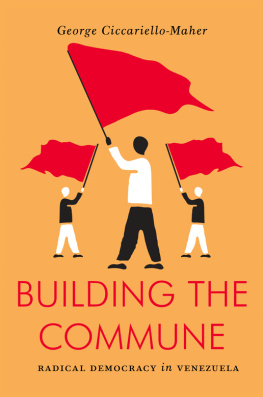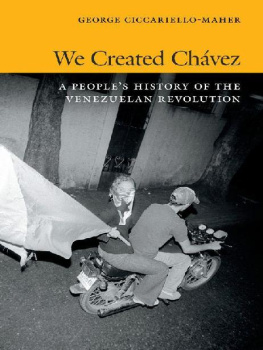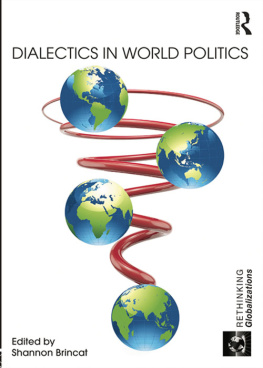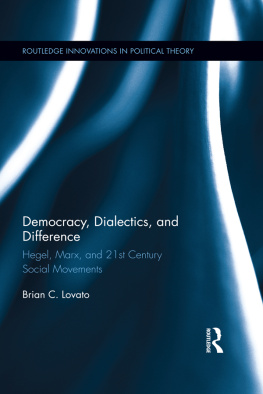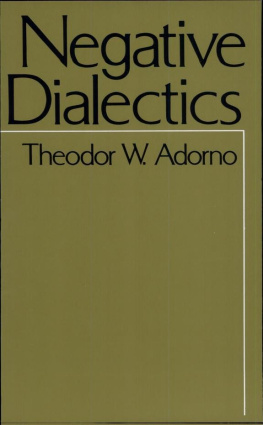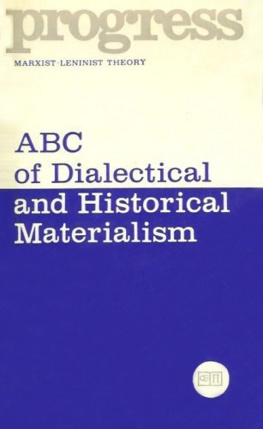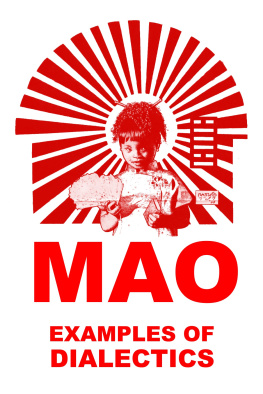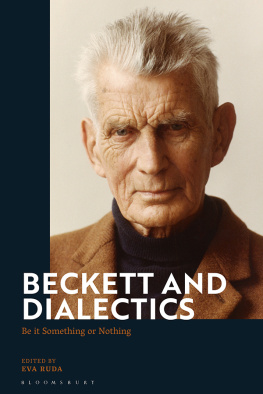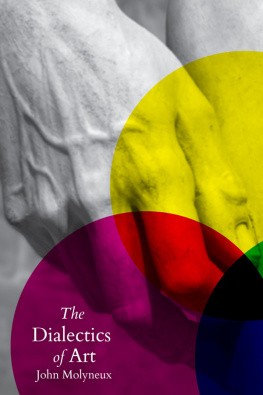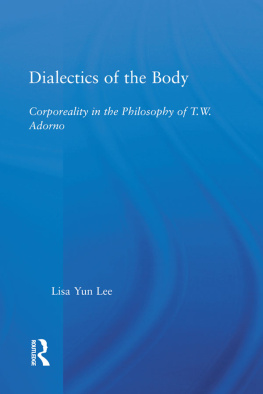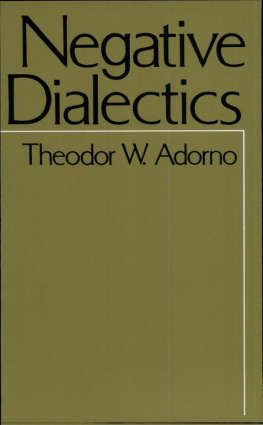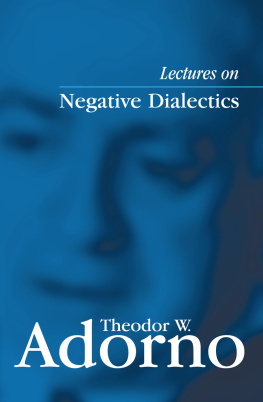RADICAL AMRICAS
A series edited by Bruno Bosteels
and George Ciccariello-Maher
DECOLONIZING
DIALECTICS

GEORGE CICCARIELLO-MAHER
Duke University Press Durham and London 2017
2017 Duke University Press
All rights reserved
Printed in the United States of America on acid-free paper
Designed by Heather Hensley
Typeset in Chaparral Pro by Westchester Publishing Services
Library of Congress Cataloging-in-Publication Data
Names: Ciccariello-Maher, George, author.
Title: Decolonizing dialectics / George Ciccariello-Maher.
Other titles: Radical Amricas.
Description: Durham : Duke University Press, 2016. | Series: Radical Amricas | Includes bibliographical references and index.
Identifiers: LCCN 2016028024 (print)
LCCN 2016029328 (ebook)
ISBN 9780822362234 (hardcover : alk. paper)
ISBN 9780822362432 (pbk. : alk. paper)
ISBN 9780822373704 (e-book)
Subjects: LCSH : Dialectic. | Postcolonialism. | Critical theory.
Classification: LCC B 809.7 . C 54 2016 (print) | LCC B 809.7 (ebook) | DDC 190dc23
LC record available at https://lccn.loc.gov/2016028024
Cover art: H. L. Stephens, Blow for Blow (detail), ca. 1863; reproduction number LC-USZC 4-2523. Courtesy of the Library of Congress.
G. W. F.
W. E. B.
C. L. R.
F. O. F.
H. C. F.
CONTENTS
This book was conceived in Berkeley, written largely in Caracas, and completed in Philadelphiait bears the marks of each within it. Forever ago, it was not a book at all, but a dissertation, and before that a list of theoretical provocateurs. For helping guide and shape its metamorphosis, my greatest debt goes to my dissertation committee: Wendy Brown, Mark Bevir, Pheng Cheah, Kiren Chaudhry, and Nelson Maldonado-Torres. Wendy guided and pressed me to overcome my own limitations and blind spots, to think harder and to think better, and to prize commitment, all with a firm generosity that I can only hope to emulate. I arrived a pretender without much in the way of social graces, and she was kind even when I put my foot in my mouth. No single individual has seen more of what follows than she has, and even what she has not seen bears her indelible mark. Few of us are so lucky.
When I asked Wendy whether my dissertation project was a good idea, she didnt hesitate for a secondwas I really going to do anything else? No, I wasnt. When I decided to move to Caracas for no apparent reason, and then to write a different book We Created Chvez when I should have been writing my dissertation, no one objected to such apparent lunacy. Kiren even memorably suggested that it would be the perfect place to get into just enough trouble; she was more than right, and I am more than grateful. Mark instilled in me a no-nonsense historical sensibility that has been consistently valuable. Phengs commentary always combined a lucid rigor with an only occasionally daunting bluntness.
Nelson Maldonado-Torres welcomed me warmly into the fold of ethnic studies: by introducing me to Fanon and Dussel, inviting my participation in the Caribbean Philosophical Association and last-minute trips to Zapatista territory in the Selva Lacandona, he helped to set me down the path I now tread. He brought me into a supportive community including Jorge Gonzalez, Ramn Grosfoguel, Roberto D. Hernndez, Richard Pithouse, Anbal Quijano, Neil Roberts, Daphne Taylor-Garca, and many others, not to mention the inimitable Jane Anna Gordon and Lewis Gordon, and the entire board of the Caribbean Philosophical Associationwhich remains one of the most welcoming and supportive intellectual communities in existence. Nelson further encouraged me to translate Latin American theory, a sometimes-thankless task but one without which this book would never have been what it is. Enrique Dussel has been a disarmingly kind collaborator and supportive interlocutor along the way.
Wendys dissertation group provided essential feedback in the early stages of this project, and was the perfect ratio of comradely and challenging: Diana Anders, Libby Anker, Ivan Ascher, Ali Bond, Mona Bower, Matt Baxter, Yasmeen Daifallah, Jennifer Denbow, Tim Fisken, Jack Jackson, Asaf Kedar, Sarah Kendall, Annika Thiem, Zhivka Valiavicharska, Yves Winter, and others I have inevitably forgotten. Senior cadresparticularly Jimmy Casas Klausen, Robyn Marasco, and Sharon Stanleyled us by example, as they continue to lead.
While at Berkeley, I taught some of these thinkers alongside Jeffrey Paris in the Prison University Project at San Quentin State Prison. To our students, whose insatiable taste for the concrete did not undermine the pleasure they took in abstraction: seeing some of you escape the gulag is more than I could possibly ask for.
As I was finishing my time at Berkeley, the upsurge cameand it is this same upsurge that we are still living today. The murder of Oscar Grant on New Years Day 2009 was one of many, but one that thankfully came to matter more than most. From the flames of Oakland came the occupations at Berkeley, from which Occupy was born as a strange progeny. I treasure my friends and comrades from that period, in particular Nima Bassiri, Jasper Bernes, Joshua Clover, Robeson Taj Frazier, Satyel Larson, and Annie McClanahan, not to mention the original troublemakers at Reclamations journal: Chris Chen and Zhivka Valiavicharska. My appreciation as well to the University of California Police Department for its sheer incompetence, for never discovering my identity despite the fact that I worked right next door every day.
This book is inextricable from the context of Venezuela, where I moved in 2006 to begin teaching and learning, learning by teaching, struggling and being struggled with by student-militants at the Venezuelan School of Planning. In many senses, Decolonizing Dialectics is a theoretical companion piece to We Created Chvez , since I read and thought with these thinkers amid the combative heat of the Venezuelan crucible. It should be said, however, that from Venezuela I have taken far more than I have given, from those revolutionary movements that have provided me not only inspiration but also the concrete foundation required for any thought to become real. Today, Venezuelans continue to teach what it means to not back down, turning defeat into new victories, one step back into two steps forward.
My colleagues at Drexel have been sympathetic and supportive, and the university has been both understanding and patient, despite the hate mail it has brought. Julie Mostov in particular has been unfailingly kind. At the University of Pennsylvania, Tulia Falleti, Jeff Green, Andy Lamas, Anne Norton, Rogers Smith, and Bot Vitalis have been encouraging, as have many UPenn graduate students, Osman Balkan in particular. I am more than grateful for the recent support that many have shown for this project: particularly Amy Allen, Linda Martn Alcoff, and Charles Mills, not to mention my theory comrades of various shades of red: Paul Apostolidis, Anita Chari, Glen Coulthard, Andrew Dilts, Jeanne Morefield, Robert Nichols, Corey Robin, Jakeet Singh, and Antonio Vzquez-Arroyo.
The arguments that make up this book have been tested and enunciated, in written form but just as often in the streets. In their clearer expressions, they have been presented at APSA , WPSA , APA , APT , and the CPA ; Rethinking Marxism; the Sciences Po; the University of Pennsylvania Political Theory Workshop; Ed Emerys autonomist conference at Cambridge some years back; the Georgetown University Institute for Global History; the International Association for Philosophy and Literature; and the International Congress of Americanists. Early versions of some arguments have appeared in The Commoner , Contemporary Political Theory , Human Architecture , Listening , and Theory & Event . The last of these warrants special comment, since past and current editors of Theory & Event Jodi Dean, Davide Panagia, and James Martel, in particularwelcomed me immediately and warmly as a combative fellow traveler.
Next page

